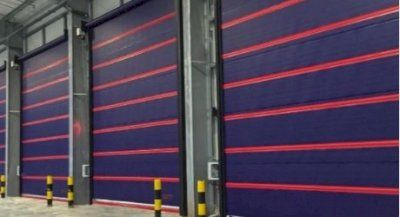Tackling waste sector challenges
We have built up extensive knowledge of overcoming the challenges of often corrosive and harsh environments in the waste sector.
If you work in the waste and energy from waste sector you will be aware of some of the challenges you face on site around health and safety. Such as the need to keep vermin out and odours in – and to operate sympathetically with your neighbours.
Here we address some of the challenges and identify how we’re working with customers to overcome these.
Odour and vermin
Odour is an obvious bi-product of a site where waste is collected. No matter the steps taken after collection such as sorting, repurposing or incinerating waste to generate energy.
A waste site can be an unpleasant and potentially hazardous environment to work in. It is important that when a site door or waste chute door is open, it is closed quickly. This will not only benefit staff working onsite but those living in surrounding areas too.
Sites operate under strict conditions set by local authorities regarding health and safety and vermin control. Again, here door speed plays an important role, as does reliability.
Waste businesses need highly reliable doors which open and close quickly multiple times a day. In response to this, we developed the Speedor Storm.
This is designed for frequent use in high traffic situations. It is able to withstand winds of up to 90 mph. Like all our doors, it is built to last with a life expectancy of more than 20 years. With regular maintenance we have customers whose doors have lasted more than 30 years!
Noise
With a high traffic site, such as a waste plant, there is also increased noise pollution. This is caused by the level of activity on the site from vehicles and machinery. Our doors play an important role in helping to reduce the impact of excess noise.
For instance, our Speedor Storm is made from a thicker curtain material. Multilayer PVC textile offers longevity (as it is less likely to split and tear). It also provides a denser door, with more layers that are able to absorb sound.
Corrosive and humid environments
In energy from waste (EFW) plants, the combustion of waste generates a variety of corrosive chlorine containing compounds as well as sodium and potassium.
Therefore, to ensure and maintain the longevity of our industrial high-speed doors, we have trialled and tested an anti-corrosive paint to which can be applied to any exposed element.
EFW plant environments are also extremely humid, as various combustion processess take place including the production of compost from food waste.
We therefore realised that it was important to protect door elements from moisture and include IP65 drives – which have been developed specifically for challenging environments like waste facilities – and heated insulated covers to prevent moisture build up.
Additional benefits for waste sector clients
In addition to solving core challenges faced in the sector, our range of high speed doors come with a number of additional benefits, developed from our decades of experience.
Further benefits of our Speedor Storm include:
- Reduced energy costs
- Improved environment and working conditions
- Reduced carbon footprint
- Enhanced productivity
- Low maintenance
We also provide further safety features to our doors such as safety photocells, non-contact safety light curtains, movement sensors and laser detection.
Our experienced installers are also electrically trained and can therefore configure control panels for automatic door operations that can also interface with unloading vehicles.
Find out more about our Speedor Storm. You can read about our work in the waste sector with Veolia, West Mercia EFW and more recently our work to supply seven insulated shutters and a Speedor Storm at the Dundee and Angus EFW plant at Baldovie.

